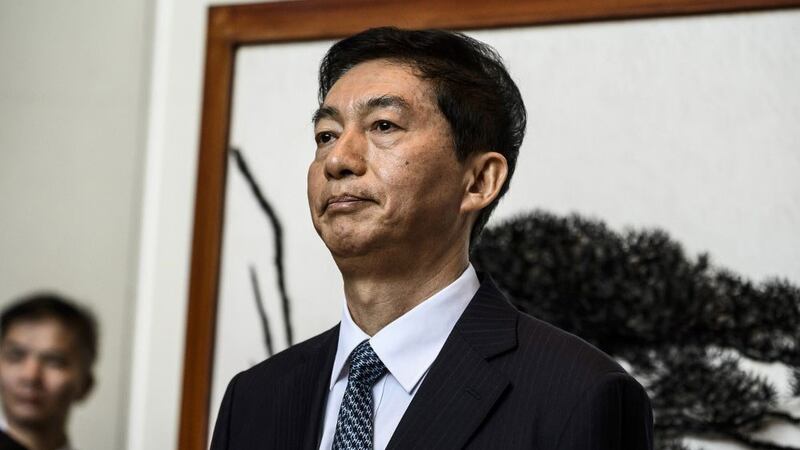Students at a Hong Kong university where riot police fired hundreds of rounds of tear gas and were met with petrol bombs hurled across makeshift barricades in November, returned to class on Monday after police made dozens more arrests during a protest at the weekend.
Students returned to the Shatin campus of the Chinese University of Hong Kong (CUHK) for the first time after the authorities ended the last semester early following the campus battle, which saw police fire some 1,000 rounds of tear gas in an assault on the main campus.
While the majority of damage to campus facilities had been repaired, including widespread protest graffiti, a Goddess of Democracy statue remained near the college entrance, bearing a banner with the words "Five demands, not one less."
Workers were still resurfacing the No. 2 bridge, where the conflict between police and protesters had been most fierce, and debris from the siege including spent tear gas canisters, umbrellas and gas mask filters remained strewn around a nearby grassy slope, the Apple Daily newspaper reported.
"Several CUHK school buses damaged during the conflict are still parked in the campus, looking like a school bus cemetery," the paper reported.
Security was tight, with newly installed checkpoints requiring a current student ID card to get in, university president Rocky Tuan announced in an open letter to students.
"For security reasons, access to the University remains restricted and controlled for the time being," Tuan said. "I must ask for your patience and understanding in allowing time for the campus to ease back to its former state of diversity and vibrancy."

'Negligible' levels of chemicals
Tuan said the authorities had taken soil, air and water samples and tested them for harmful materials, "including dioxins and cyanide," in a reference to widespread public health concerns over the effects of lingering tear gas residue on public health.
"All test results have been received, and I am pleased to report that the levels of the harmful chemicals tested are all negligible and do not pose danger to human health," he wrote.
As the city began its eighth month of protests, Beijing replaced its envoy to Hong Kong with an official who reminded the city's seven million people that its most powerful supporter was "the motherland."
"Over the last six months, Hong Kong's situation has been worrying," Luo Huining said as he took over the directorship of Beijing's Central Liaison Office in Hong Kong.
"I sincerely wish Hong Kong and Hong Kong compatriots well," said Luo, who replaces Wang Zhimin, who had only been in post for a couple of years.
Luo's arrival coincided with renewed clashes between between police and protesters in Sheung Shui district on Sunday following a protest over the sheer number of cross-border shoppers from neighboring mainland Chinese cities who use the city as a source for trusted brands in essential household goods, including infant formula milk.
Brands made in China have been hit by a string of public health scandals including the tainted milk scandal that left unknown numbers of babies and toddlers affected by melamine added to the powder to resemble protein.
"Parallel traders" also take advantage of duty-free goods -- especially medicines and medical supplies -- bought in bulk under Hong Kong's separate status as a free port, lugging them back across the border to sell.
Parallel trading
Parallel trading has affected local communities by spawning large numbers of similar shops and large-scale facilities to cater to mainland shoppers who pile into neighborhoods in buses, prompting growing tensions with local residents.
Some 10,000 people took to the streets of Sheung Shui on Sunday, with the majority dispersing at the end of the march, before police launched a baton charge at the remainder with no apparent provocation.
More than a million people took to the streets of Hong Kong on New Year's Day in a resounding reminder to the city authorities that the past six months of pro-democracy protests will continue into 2020.
Protesters continue to call on the administration of chief executive Carrie Lam to meet all five demands of the protest movement, which include full democracy and an independent inquiry into police violence against protesters.
While Lam has formally withdrawn widely hated plans to change Hong Kong's extradition laws, she and her officials have repeatedly ruled out meeting the other four demands.
Rights groups have criticized the Hong Kong authorities for fueling violence with excessive force in their treatment of protesters, as well as limiting and prevent legitimate and non-violent protest and assembly since the anti-extradition movement took off in early June.
There are growing calls from rights groups, pro-democracy politicians and overseas officials for an independent public inquiry into police violence and abuse of power.
Campaigners have demanded that police make public the provenance and chemical composition of the tear gas they use, to enable medical practitioners to formulate treatment plans accordingly. But police have refused, saying that doing so could compromise their operations.
They also have called on police to refrain from using disproportionate and deadly force, but police have repeatedly reviewed their own tactics and found them to be "appropriate."
Hong Kong police have arrested nearly 6,000 people since the anti-extradition movement broadened into a city-wide pro-democracy movement in early June, with hundreds of rioting and public order prosecutions currently in the pipeline.
The bodies of a number of young people have been found in the sea in recent months, amid speculation that a growing number of missing persons have been "disappeared," possibly to mainland China, since protests began.
Reported by RFA's Cantonese Service. Translated and edited by Luisetta Mudie.
